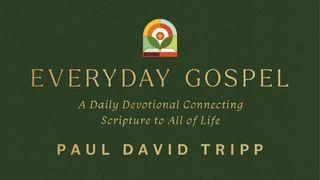“When You Pray, Say…”: Learning to Pray Like JesusSample

PRAYING WITH CONFIDENCE
“Everyone who asks receives, and the one who seeks finds, and to the one who knocks it will be opened … If you then, who are evil, know how to give good gifts to your children, how much more will the heavenly Father give the Holy Spirit to those who ask him!” LUKE 11:10, 13 (ESV)
When a teenager who has just gotten her driver’s license asks her mom or dad for the car keys, it’s not typically a vague, half-hearted request. Instead, her mind is engaged, and her will is focused: “Please, can I have the car keys? I want the car. I want to use the car. I’m asking you for it now.”
Similarly, the verbs that Jesus uses to teach His disciples how to make requests to God in prayer—ask, seek, knock—convey urgency, consistency, and clarity. It’s as if He’s saying, I want you to pray in a way that involves humble, persistent determination. I want you to seek and go on seeking, and I want you to knock with an urgent sincerity.
He is inviting you and me to come before our heavenly Father and simply ask.
We must be careful about what we ask for, though. When we present our petitions before the Lord, they need to be tempered by the Spirit through what John Calvin calls the “bridle of the word of God.”[1] In other words, the Bible teaches that we can ask in total confidence for the things that God says are good and right—things like His help to present our bodies as living sacrifices, grow as witnesses to the gospel, or increase our desire to worship. But we must not think that we can manipulate God, demanding that He give us whatever will make our lives easier or wealthier. It is possible to “ask and … not receive, because you ask wrongly, to spend it on your passions” (James 4:3).
So we are to ask boldly, but we are also to ask humbly. We are to ask God to do great things, and then we are to accept His answer. There are good reasons why God will not always give us what we ask, even when what we ask is good and godly. Our prayers are not always in accordance with His good and sovereign will. We cannot always determine what’s good for us—but God always knows what’s best for His children. Therefore, when we bring our requests before God, we must look to His word as our roadmap and remember that He is working to bring about His purposes for our lives and conform us to His Son's image.
So come before God and just ask. Your requests can be specific, bold, and shaped by God’s word—and then you can expect, and indeed desire, God to answer them exactly as He sees fit.
- How is God calling me to think differently?
- How is God reordering my heart’s affections—what I love?
- What is God calling me to do as I go about my day today?
Further Reading: COLOSSIANS 1:9-12
We adapted this plan from another resource. Learn More about Truth For Life and Alistair Begg.
Devotional material is taken from the Truth For Life daily devotional by Alistair Begg, published by The Good Book Company, thegoodbook.com. Used by Truth For Life with permission. Copyright (C) 2021, The Good Book Company.
[1] Commentary on a Harmony of the Evangelists Matthew, Mark, and Luke, trans. William Pringle (Calvin Translation Society, 1846), Vol. 3, p 19.
Scripture
About this Plan

For most Christians, not much is harder to establish and maintain than a meaningful prayer life. Although we seem to find time to do just about anything else, it often seems that when we get to the issue of prayer, everything works against us. In this eight-day plan, Alistair Begg turns to the Lord’s Prayer in Luke 11 to consider what, how, and why we should pray.
More
Related plans

Holy Spirit - Breath of God

In Her Image: Character Study of the Proverbs 31 Woman

Laying Hold of a Divine Perspective: A 3-Day Marriage Plan

Esther’s Legacy: Embracing Your Role in God’s Sovereign Plan

Acquiring Discernment

The Familiar Stranger

Everyday Gospel: A Daily Devotional Connecting Scripture to All of Life

Desperate Prayers for Hope in Hard Times

The Treasure I Married: A 3-Day Marriage Plan
